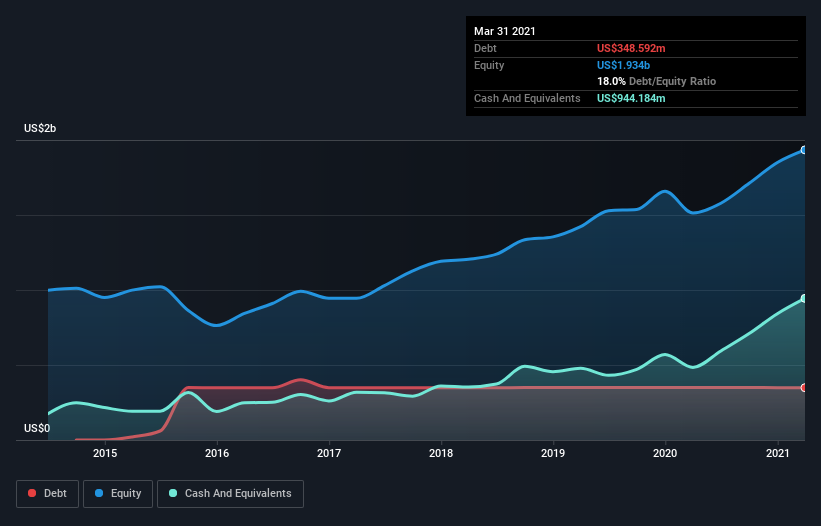ICON (NASDAQ:ICLR) Seems To Use Debt Rather Sparingly
Warren Buffett famously said, 'Volatility is far from synonymous with risk.' It's only natural to consider a company's balance sheet when you examine how risky it is, since debt is often involved when a business collapses. We note that ICON Public Limited Company (NASDAQ:ICLR) does have debt on its balance sheet. But is this debt a concern to shareholders?
Why Does Debt Bring Risk?
Generally speaking, debt only becomes a real problem when a company can't easily pay it off, either by raising capital or with its own cash flow. In the worst case scenario, a company can go bankrupt if it cannot pay its creditors. While that is not too common, we often do see indebted companies permanently diluting shareholders because lenders force them to raise capital at a distressed price. Of course, debt can be an important tool in businesses, particularly capital heavy businesses. When we examine debt levels, we first consider both cash and debt levels, together.
See our latest analysis for ICON
How Much Debt Does ICON Carry?
As you can see below, ICON had US$348.6m of debt, at March 2021, which is about the same as the year before. You can click the chart for greater detail. However, its balance sheet shows it holds US$944.2m in cash, so it actually has US$595.6m net cash.
How Healthy Is ICON's Balance Sheet?
According to the last reported balance sheet, ICON had liabilities of US$1.08b due within 12 months, and liabilities of US$452.2m due beyond 12 months. On the other hand, it had cash of US$944.2m and US$1.14b worth of receivables due within a year. So it can boast US$549.4m more liquid assets than total liabilities.
This surplus suggests that ICON has a conservative balance sheet, and could probably eliminate its debt without much difficulty. Succinctly put, ICON boasts net cash, so it's fair to say it does not have a heavy debt load!
While ICON doesn't seem to have gained much on the EBIT line, at least earnings remain stable for now. When analysing debt levels, the balance sheet is the obvious place to start. But it is future earnings, more than anything, that will determine ICON's ability to maintain a healthy balance sheet going forward. So if you want to see what the professionals think, you might find this free report on analyst profit forecasts to be interesting.
Finally, a company can only pay off debt with cold hard cash, not accounting profits. ICON may have net cash on the balance sheet, but it is still interesting to look at how well the business converts its earnings before interest and tax (EBIT) to free cash flow, because that will influence both its need for, and its capacity to manage debt. Over the last three years, ICON recorded free cash flow worth a fulsome 92% of its EBIT, which is stronger than we'd usually expect. That puts it in a very strong position to pay down debt.
Summing up
While we empathize with investors who find debt concerning, you should keep in mind that ICON has net cash of US$595.6m, as well as more liquid assets than liabilities. The cherry on top was that in converted 92% of that EBIT to free cash flow, bringing in US$489m. So is ICON's debt a risk? It doesn't seem so to us. Above most other metrics, we think its important to track how fast earnings per share is growing, if at all. If you've also come to that realization, you're in luck, because today you can view this interactive graph of ICON's earnings per share history for free.
If you're interested in investing in businesses that can grow profits without the burden of debt, then check out this free list of growing businesses that have net cash on the balance sheet.
This article by Simply Wall St is general in nature. It does not constitute a recommendation to buy or sell any stock, and does not take account of your objectives, or your financial situation. We aim to bring you long-term focused analysis driven by fundamental data. Note that our analysis may not factor in the latest price-sensitive company announcements or qualitative material. Simply Wall St has no position in any stocks mentioned.
Have feedback on this article? Concerned about the content? Get in touch with us directly. Alternatively, email editorial-team (at) simplywallst.com.

